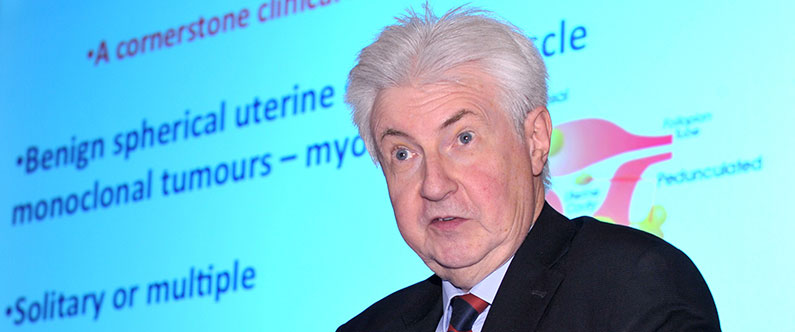New uterine fibroids therapies discussed at WCM-Q Grand Rounds
 Dr. Barlow said that finding an effective treatment for uterine fibroids was important because they can negatively affect fertility.
Dr. Barlow said that finding an effective treatment for uterine fibroids was important because they can negatively affect fertility.
At the latest installment of Weill Cornell Medicine – Qatar’s Grand Rounds, one of Qatar’s most senior obstetrician-gynecologists discussed the latest treatment options for uterine fibroids.
Dr. David Barlow, director of women’s services at Hamad Medical Corporation and chairman of the Department of Obstetrics and Gynecology at The Women’s Hospital, discussed the most commonly used surgical procedures for removal of uterine fibroids and new drug therapies that have been developed to manage the condition without the need for surgery.
Uterine fibroids are very common non-cancerous tumors that form on the wall of the uterus. It is believed as many as 70 to 80 percent of women will have uterine fibroids at some point in their lives, though most will not notice them because they often cause no symptoms. For those women who do experience symptoms, these can include heavy or painful periods and pain in the abdomen or lower back. In rare cases, uterine fibroids can affect pregnancy or cause infertility.
Speaking at WCM-Q to an audience of physicians, researchers, students and healthcare professionals, Dr. Barlow said:
“Finding effective treatments for uterine fibroids is important because they affect a large number of women and can be extremely painful and distressing, and can also negatively affect fertility, which is naturally very distressing. Fortunately, surgical procedures and new drug therapies have proven to be quite effective and there have been promising new developments recently.”
The Grand Rounds, developed by WCM-Q’s Division of Continuing Professional Development, provides a platform for expert speakers to engage with healthcare professionals in the community to disseminate knowledge of the latest developments in medical technology, research and best practice.
Uterine fibroids can range from pea-sized to the size of a melon. They are linked to the hormone estrogen and are most common during childbearing years when estrogen levels are highest. Dr. Barlow explained that the traditional treatment method was surgical removal of the fibroids, but this is an invasive procedure and there has been a need for an effective drug option that would shrink the fibroids and alleviate symptoms, allowing women to have children, potentially without having to have surgery. For more than a decade there has been a short-term drug option that can be used as a prelude to surgery. These are the gonadotropin releasing hormone agonists (GnRHa). However very recently a drug option has become available that has the potential to be used over an extended period of time providing the desired fibroid shrinkage and alleviated symptoms. This drug option acts on the progesterone receptor and is known as a selective progesterone receptor modulator (SPRM). This option is likely to especially useful for women with fibroids seeking pregnancy and for older women with fibroids who would like to avoid hysterectomy.
Dr. Sohaila Cheema, director of global and public health at WCM-Q, said:
“We are delighted that we were able to hear from such a recognized authority as Dr. Barlow about these new developments in the treatment of uterine fibroids. By sharing his knowledge with us at Grand Rounds, Dr. Barlow has provided an extremely valuable service to members of the medical community in Qatar and the patients with whom they work.”